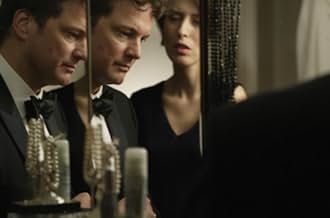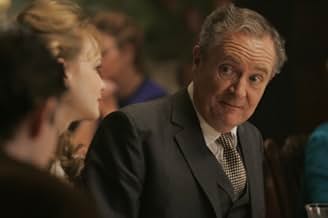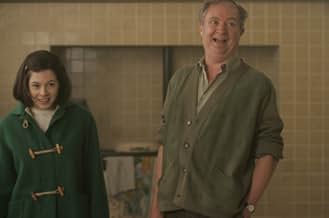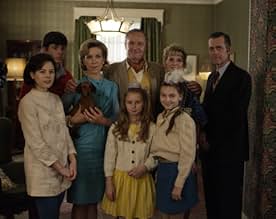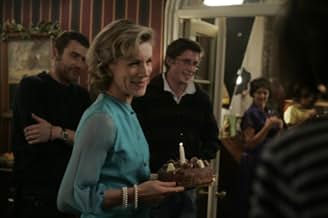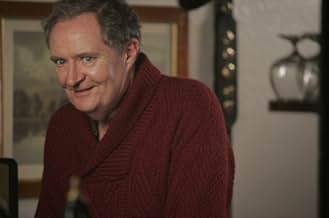And When Did You Last See Your Father?
- 2007
- Tous publics
- 1h 32min
NOTE IMDb
6,8/10
4,8 k
MA NOTE
Ajouter une intrigue dans votre langueThe story of a son's conflicting memories of his dying father.The story of a son's conflicting memories of his dying father.The story of a son's conflicting memories of his dying father.
- Réalisation
- Scénario
- Casting principal
- Récompenses
- 1 victoire et 12 nominations au total
Avis à la une
At the end of the last conversation I had with my father before he died, he called me a horse's ass. That conversation was the final topper to a very complicated relationship as my father was a man that I feared as a child and pretty much disliked as an adult. Yet, some of the fondest memories I have of my life involve my father and our times together.
I guess all relationships between fathers and sons could best be described as knotty, but the one shown in this film, I must admit, hit very close to home. Perhaps that's why I enjoyed the film as much as I did, and it appears from the comments of viewers and critics that I enjoyed it far more than most viewers.
The basic story, I'm sure, has been repeated countless times throughout history and will be repeated countless times in the future. Blake, a highly successful writer and editor, never received the recognition of "a job well done" from his father. Arthur is a popular physician and raconteur who constantly failed to show his admiration for his son's profession.
Blake realized at an early age that his father had been having a long-term affair with his aunt, and this knowledge colored every part of their relationship. One thing that Blake cannot understand is why his mother stays married to his father for he is sure that she, also, is aware of her husband's relationship with her sister.
The story begins in the present, but most of it is told in flashbacks as Arthur is dying. The adult Blake is played by Colin Firth with just the right amount of distance and depression. He is not a happy man because he never has been able to come to terms with his feelings for his father. Teenaged Blake is played beautifully by Matthew Beard. It is this Blake that we see most of in the film, and his performance is impressive.
Juliet Stevenson is a wonderful actress, and she gives this film a strong, quiet - but not necessarily longtime suffering - performance as Blake's mother. She is one of those women whom you never realize her strength and resourcefulness until push comes to shove.
Jim Broadbent may be a touch over the top as Arthur, but, for me, he hits the nail on the head. We all have public and private faces. Arthur rarely reveals the private one. I found myself liking him in spite of myself.
As I said, this film turned out to be very personal to me. I found myself sometimes being amazed at how much Arthur was like my own father and Blake so much like myself. Even without the personal insight, I think you will find this a rewarding look at the bond between two strong, yet totally different men - OR - the bond between two strong, completely similar men. Fathers and sons - will that connection ever be fully understood?
I guess all relationships between fathers and sons could best be described as knotty, but the one shown in this film, I must admit, hit very close to home. Perhaps that's why I enjoyed the film as much as I did, and it appears from the comments of viewers and critics that I enjoyed it far more than most viewers.
The basic story, I'm sure, has been repeated countless times throughout history and will be repeated countless times in the future. Blake, a highly successful writer and editor, never received the recognition of "a job well done" from his father. Arthur is a popular physician and raconteur who constantly failed to show his admiration for his son's profession.
Blake realized at an early age that his father had been having a long-term affair with his aunt, and this knowledge colored every part of their relationship. One thing that Blake cannot understand is why his mother stays married to his father for he is sure that she, also, is aware of her husband's relationship with her sister.
The story begins in the present, but most of it is told in flashbacks as Arthur is dying. The adult Blake is played by Colin Firth with just the right amount of distance and depression. He is not a happy man because he never has been able to come to terms with his feelings for his father. Teenaged Blake is played beautifully by Matthew Beard. It is this Blake that we see most of in the film, and his performance is impressive.
Juliet Stevenson is a wonderful actress, and she gives this film a strong, quiet - but not necessarily longtime suffering - performance as Blake's mother. She is one of those women whom you never realize her strength and resourcefulness until push comes to shove.
Jim Broadbent may be a touch over the top as Arthur, but, for me, he hits the nail on the head. We all have public and private faces. Arthur rarely reveals the private one. I found myself liking him in spite of myself.
As I said, this film turned out to be very personal to me. I found myself sometimes being amazed at how much Arthur was like my own father and Blake so much like myself. Even without the personal insight, I think you will find this a rewarding look at the bond between two strong, yet totally different men - OR - the bond between two strong, completely similar men. Fathers and sons - will that connection ever be fully understood?
This is a beautifully written, well acted but above all wonderfully directed film looking at a man who learns about himself by finding out about his father. Colin Firth plays a real writer who wrote an auto-biographical novel about his relationship with his father played by Jim Broadbent. It's not a spoiler to say that the father is dying because that diagnosis is given very early on. While the family waits for him to die, events take Firth's memories effortlessly through his past showing him played very well by young actors at 8 and 17.
The events are funny and moving but restrained within a believable reality. Firth learns to live with his father's behaviour as we see that he isn't perfect either. It's positive about life without being sentimental, terrific film.
The events are funny and moving but restrained within a believable reality. Firth learns to live with his father's behaviour as we see that he isn't perfect either. It's positive about life without being sentimental, terrific film.
After seeing 'When Did You Last See Your Father?', I was reminded that I was relieved that when I lost my Father a scant four years ago, we parted on very good terms. This is a powder keg of a film that manages to spill many tears & hidden truths about a father & son. The story, taken from the true accounts by writer Blake Morrison,is about the love/hate, love/love, hate/hate relationship Morrison shared with his own father, played to perfection by Jim Broadbent (of many a Mike Leigh film). Besides the well written/adapted screenplay,top notch direction & superb acting by the entire cast, I really admired the photography, utilizing light & dark & positioning as a framing device. The films's editing is a sight to behold, too (the way the action cuts back & forth in time over a period of 30 plus years). Hopefully, when Oscar time rolls around next year, 'When Did You Last See Your Father' will be a prime contender for at least a couple of awards.
"And When Did You Last See Your Father?" (2007) is an English film directed by Anand Tucker. It reminded me of the U.S. film, "The Savages," because the central plot of both movies involves a dying father who has not lived an exemplary life. Jim Broadbent is superb as Arthur, an obviously wealthy man who nevertheless goes through life cheating and manipulating people in small ways. He has a bluff, hearty, hail-fellow-well-met personality that charms people who meet him for the first time. In reality, he bullies his son and cheats on his wife. (Juliet Stevenson is excellent in the supporting role of wife and mother, as is Matthew Beard who plays Blake as a teenager.)
Colin Firth is equally convincing as Arthur's son, Blake. He's a successful award-winning writer, who nonetheless sees himself as perpetually in his father's shadow. Both men must come to grips with the situation when Arthur develops terminal cancer.
Broadbent and Firth look like each other, so it's easy to accept them as father and son. The film unfolds in an intelligent and interesting fashion. It's both artistically satisfying and philosophically challenging. I think the movie has been underrated by IMDb viewers. It's low key and thoughtful, but that's what it's supposed to be. There's nothing about it that struck me as artificially artistic. It's an honest and effective film, and worth seeking out and seeing.
Colin Firth is equally convincing as Arthur's son, Blake. He's a successful award-winning writer, who nonetheless sees himself as perpetually in his father's shadow. Both men must come to grips with the situation when Arthur develops terminal cancer.
Broadbent and Firth look like each other, so it's easy to accept them as father and son. The film unfolds in an intelligent and interesting fashion. It's both artistically satisfying and philosophically challenging. I think the movie has been underrated by IMDb viewers. It's low key and thoughtful, but that's what it's supposed to be. There's nothing about it that struck me as artificially artistic. It's an honest and effective film, and worth seeking out and seeing.
Reel Inspiration Review: When Did You Last See Your Father.
When Did You Last See Your Father ignores standard Hollywood wisdom: Keep the title short and catchy. Avoid flashbacks. The action should be external, not internal. Make films that appeal to teenage boys. And most of all, don't do stories about old, dying people.
In an article about what sells in Hollywood, an agent moans that she just can't read one more story about coping with aging, dying parents. The market was glutted with them. I couldn't help but think that this must be a very timely and heartfelt theme since it was popping up in so many scripts. Is it possible that there's an adult audience hungry for stories that help them deal with the hard issues in their lives?
When Did You Last See Your Father is based on Blake Morrison's heart wrenchingly honest autobiographical bestseller. It is the story of the forty year old writer's attempts to resolve his troubled relationship with his father as he deals with his immanent death. Collin Firth courageously portrays the estranged son's sometimes unlikable sentiments of resentment, frustration, confusion, and disappointment tinged with compassion for his fading father. Being home brings back memories of coming of age in his charismatic father's shadow and discovering some hard realities about the man. Thanks to Jim Broadbent's dynamic performance, we can see why the son was once proud of him - even though he never felt his father's approval. Blake goes on an internal journey where he finds that he has some of his father's weaknesses. He must decide what kind of man he is to become. At first, the film's lengthy title seems to accuse the grown son of neglecting his father. But by the end, we discover that the title actually asks, "When was the last time you really saw your father - without your own feelings of inadequacy and resentment getting in the picture? When was the last time you saw love?"
Movie Blessings! Jana Segal reelinspiration dot blogspot dot com
When Did You Last See Your Father ignores standard Hollywood wisdom: Keep the title short and catchy. Avoid flashbacks. The action should be external, not internal. Make films that appeal to teenage boys. And most of all, don't do stories about old, dying people.
In an article about what sells in Hollywood, an agent moans that she just can't read one more story about coping with aging, dying parents. The market was glutted with them. I couldn't help but think that this must be a very timely and heartfelt theme since it was popping up in so many scripts. Is it possible that there's an adult audience hungry for stories that help them deal with the hard issues in their lives?
When Did You Last See Your Father is based on Blake Morrison's heart wrenchingly honest autobiographical bestseller. It is the story of the forty year old writer's attempts to resolve his troubled relationship with his father as he deals with his immanent death. Collin Firth courageously portrays the estranged son's sometimes unlikable sentiments of resentment, frustration, confusion, and disappointment tinged with compassion for his fading father. Being home brings back memories of coming of age in his charismatic father's shadow and discovering some hard realities about the man. Thanks to Jim Broadbent's dynamic performance, we can see why the son was once proud of him - even though he never felt his father's approval. Blake goes on an internal journey where he finds that he has some of his father's weaknesses. He must decide what kind of man he is to become. At first, the film's lengthy title seems to accuse the grown son of neglecting his father. But by the end, we discover that the title actually asks, "When was the last time you really saw your father - without your own feelings of inadequacy and resentment getting in the picture? When was the last time you saw love?"
Movie Blessings! Jana Segal reelinspiration dot blogspot dot com
Le saviez-vous
- AnecdotesMatthew Beard wore brown coloured contact lenses in order to look more like Colin Firth.
- ConnexionsFeatured in Starfilm (2017)
- Bandes originalesCold Cold Feeling
Written by JM Robinson
Published by EMI Music Publishing Ltd
Performed by T-Bone Walker
Licensed courtesy of EMI Records Ltd
Meilleurs choix
Connectez-vous pour évaluer et suivre la liste de favoris afin de recevoir des recommandations personnalisées
Détails
- Date de sortie
- Pays d’origine
- Sites officiels
- Langue
- Aussi connu sous le nom de
- When Did You Last See Your Father?
- Lieux de tournage
- Sociétés de production
- Voir plus de crédits d'entreprise sur IMDbPro
Box-office
- Budget
- 8 000 000 $US (estimé)
- Montant brut aux États-Unis et au Canada
- 1 077 273 $US
- Week-end de sortie aux États-Unis et au Canada
- 39 210 $US
- 8 juin 2008
- Montant brut mondial
- 2 752 471 $US
- Durée
- 1h 32min(92 min)
- Couleur
- Mixage
- Rapport de forme
- 2.35 : 1
Contribuer à cette page
Suggérer une modification ou ajouter du contenu manquant







